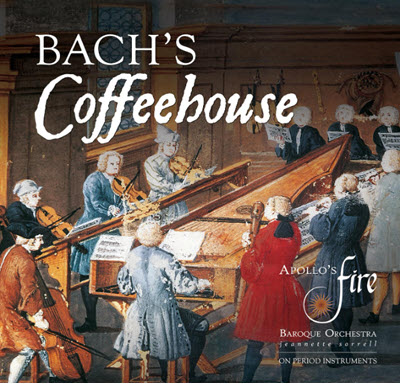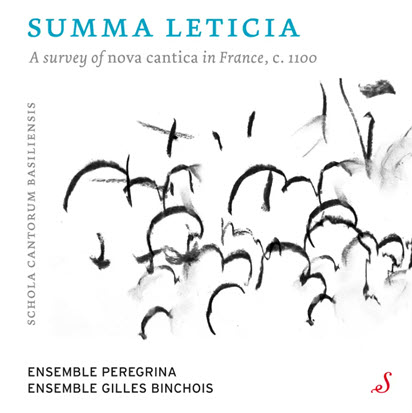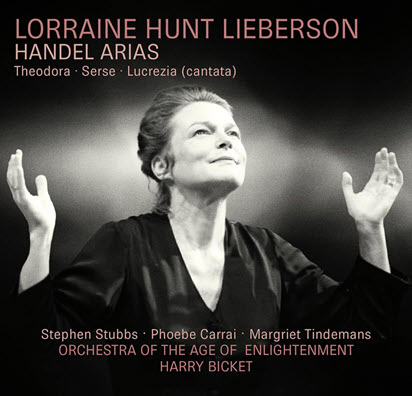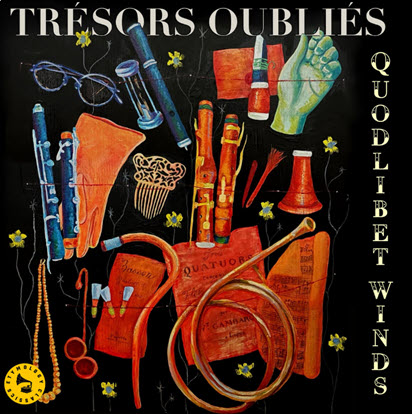by Aaron Keebaugh
Published January 19, 2025
Bach’s Coffeehouse. Music by Bach, Telemann, Vivaldi. Apollo’s Fire, directed by Jeannette Sorrell. Avie AV2520

You’re sick of your job. Your boss is a jerk. You want to just phone it in. And you’d be in good company, too, for even Johann Sebastian Bach wasn’t above quiet quitting. A week in the composer’s life was often so busy that it seemed natural his ceaseless drive would fade. For several years, while serving as Thomaskantor, the composer organized all the music for Leipzig’s principal churches, composed and performed cantatas every week, and taught the boys of the school every day.

Even with his endless creativity and enthusiasm, Bach’s experience was far from enjoyable, and he routinely fell into heated arguments with the town council. But he found time to unwind at Zimmermann’s coffeehouse, which sponsored weekly concerts by the Collegium Musicum, a student orchestra that Bach eventually took charge of in 1729 — at the expense of much else.
Bach’s retreat into things more loose, free, and emotionally satisfying now serves as inspiration for Jeannette Sorrell and Apollo’s Fire, who capture that sense of renewal with Bach’s Coffeehouse. Recorded in separate sessions (from 2018 to 2023) and played with live-wire intensity, the music on this best-selling album goes down as strong as a demitasse of fine espresso.
Yet it’s not all fire and turbulence. While Sorrell, from the harpsichord, brings out a tasteful joie de vivre in the Brandenburg Concerto No. 4, the music generates more joy than flair. Rapid violin passages do eventually turn up the heat, and the outer movements teem with spirited elan.
Even the congenial Andante conveys its emotional weight with a sense of newfound zest. Violinist Alan Choo makes the conversation with recorders, played by Daphna Mor and Kathie Stewart, feel warm and at ease.

That’s also the effect the musicians bring to Bach’s Concerto for Oboe and Violin. Subtle rubatos engender a feeling of slight apprehension, as if the phrases are seeking, but only belatedly finding, resolution. Debra Nagy’s oboe coos sweetly in the Allegro and Adagio as violinist Johanna Novom spins delicate lines around her. The continuo support is just as sensitive to the rise and fall of the lines overhead. And while the musicians fan larger flames in the final movement, the music flickers with more of a controlled burn than a raging conflagration. Like Bach at Zimmermann’s coffeehouse, Apollo’s Fire lets the tension go while looking to have a good time.
They find a sense of play in Telemann’s quirky Burlesque de Don Quixotte. Even when rendered deliberately, as it is here, the overture nevertheless lilts. The other movements convey a cinematic sense of sweep. The depiction of Don Quixote on his mare, Rosinante, trots along with limpid assurance. With Sancho Panza, his charge toward the windmill shocks the ear like bolts of thunder. And the music bounds with all the requisite humor as the two heroes are tossed into the air with a blanket.
Seeming to let their hair down, the musicians tear through the remaining tracks. But delicate moments crop up along the way. The music conveying the rose-colored beauties of Dulcinea hovers in the air like a sweet fragrance. So does the “Air” from Bach’s Orchestral Suite No. 3., which glows in its quicker than usual pace.
All that sets up the “La Folia” from Vivaldi’s Sonata Op. 1, no. 12, where the musicians let their feelings run wild. Sorrell’s orchestral arrangement may leave room for solo violinists Francisco Fullana and Alan Choo and the band to shape the familiar theme with generous rubato, but the ensuing variations gradually turn up the intensity as robust upbeats give way to cascading lines in the violins. The music drives to the end with seismic power and panache. And that gives the head a jolt like any bold cup of Joe.
Aaron Keebaugh is a musicologist, educator, and writer. His work has appeared in the Musical Times, Corymbus, the Classical Review, the Boston Musical Intelligencer, and the Arts Fuse, and is an editor for the Essex Media Group in Lynn, Mass. For EMA, he recently reviewed Orlando di Lassus’ magic of turning the secular to the sacred.




